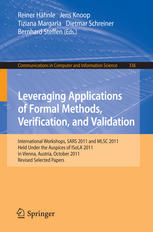

Most ebook files are in PDF format, so you can easily read them using various software such as Foxit Reader or directly on the Google Chrome browser.
Some ebook files are released by publishers in other formats such as .awz, .mobi, .epub, .fb2, etc. You may need to install specific software to read these formats on mobile/PC, such as Calibre.
Please read the tutorial at this link: https://ebookbell.com/faq
We offer FREE conversion to the popular formats you request; however, this may take some time. Therefore, right after payment, please email us, and we will try to provide the service as quickly as possible.
For some exceptional file formats or broken links (if any), please refrain from opening any disputes. Instead, email us first, and we will try to assist within a maximum of 6 hours.
EbookBell Team

0.0
0 reviewsThis volume contains a selection of revised papers that were presented at the Software Aspects of Robotic Systems, SARS 2011 Workshop and the Machine Learning for System Construction, MLSC 2011 Workshop, held during October 17-18 in Vienna, Austria, under the auspices of the International Symposium Series on Leveraging Applications of Formal Methods, Verification, and Validation, ISoLA. The topics covered by the papers of the SARS and the MLSC workshop demonstrate the breadth and the richness of the respective fields of the two workshops stretching from robot programming to languages and compilation techniques, to real-time and fault tolerance, to dependability, software architectures, computer vision, cognitive robotics, multi-robot-coordination, and simulation to bio-inspired algorithms, and from machine learning for anomaly detection, to model construction in software product lines to classification of web service interfaces. In addition the SARS workshop hosted a special session on the recently launched KOROS project on collaborating robot systems that is borne by a consortium of researchers of the faculties of architecture and planning, computer science, electrical engineering and information technology, and mechanical and industrial engineering at the Vienna University of Technology. The four papers devoted to this session highlight important research directions pursued in this interdisciplinary research project.